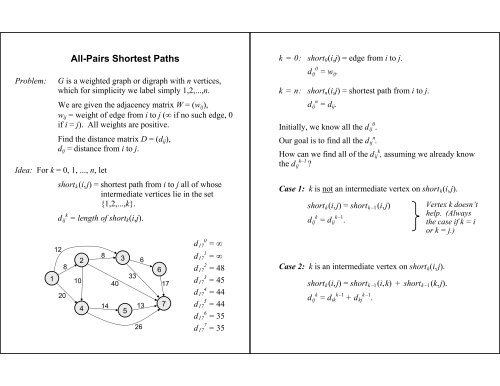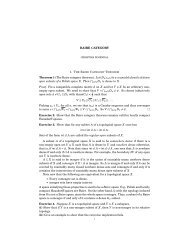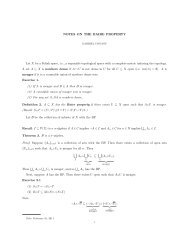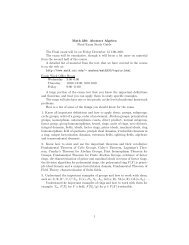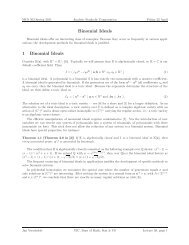All-Pairs Shortest Paths
All-Pairs Shortest Paths
All-Pairs Shortest Paths
You also want an ePaper? Increase the reach of your titles
YUMPU automatically turns print PDFs into web optimized ePapers that Google loves.
<strong>All</strong>-<strong>Pairs</strong> <strong>Shortest</strong> <strong>Paths</strong><br />
Problem: G is a weighted graph or digraph with n vertices,<br />
which for simplicity we label simply 1,2,...,n.<br />
We are given the adjacency matrix W = (wij),<br />
wij = weight of edge from i to j (∞ if no such edge, 0<br />
if i = j). <strong>All</strong> weights are positive.<br />
Find the distance matrix D = (dij),<br />
dij = distance from i to j.<br />
Idea: For k = 0, 1, ..., n, let<br />
1<br />
shortk(i,j) = shortest path from i to j all of whose<br />
intermediate vertices lie in the set<br />
{1,2,...,k}.<br />
dij k = length of shortk(i,j).<br />
12<br />
8<br />
20<br />
10<br />
2<br />
4<br />
8<br />
40<br />
3<br />
33<br />
6<br />
14 13<br />
5<br />
26<br />
6<br />
17<br />
7<br />
d17 0 = ∞<br />
d17 1 = ∞<br />
d17 2 = 48<br />
d17 3 = 45<br />
d17 4 = 44<br />
d17 5 = 44<br />
d17 6 = 35<br />
d17 7 = 35<br />
k = 0: short0(i,j) = edge from i to j.<br />
dij 0 = wij.<br />
k = n: shortn(i,j) = shortest path from i to j.<br />
dij n = dij.<br />
Initially, we know all the dij 0 .<br />
Our goal is to find all the dij n .<br />
How can we find all of the dij k , assuming we already know<br />
the dij k–1 ?<br />
Case 1: k is not an intermediate vertex on shortk(i,j).<br />
shortk(i,j) = shortk –1(i,j)<br />
dij k = dij k–1 .<br />
Case 2: k is an intermediate vertex on shortk(i,j).<br />
shortk(i,j) = shortk –1(i,k) + shortk –1(k,j).<br />
dij k = dik k–1 + dkj k–1 .<br />
Vertex k doesn’t<br />
help. (Always<br />
the case if k = i<br />
or k = j.)
Which case applies, case 1 or case 2?<br />
Answer: Whichever minimizes dij k .<br />
dij k = min( dij k–1 , dik k–1 + dkj k–1 )<br />
If we let<br />
then<br />
shortest path from i to k shortest path from k to j<br />
i<br />
shortest path from i to j (assuming it passes through k)<br />
pij k =<br />
k<br />
true if dik k–1 + dkj k–1 produces the minimum above,<br />
false otherwise,<br />
pij k is true if and only if k is an intermediate point of shortk(i,j).<br />
j<br />
Rather than compute all the pij k , the algorithm below computes<br />
Note<br />
pij = largest k for which pij k is true, or 0 if pij k is false for all k.<br />
pij = the highest-numbered intermediate point on the shortest<br />
path from i to j, or 0 if there are no intermediate points.<br />
We can compute all the dij k and pij in Θ(n 3 ) time by:<br />
for ( i = 1,2,...,n )<br />
for ( j = 1,2,...,n )<br />
dij 0 = wij;<br />
pij = 0;<br />
for ( k = 1,2,...,n )<br />
for ( i = 1,2,...,n )<br />
for ( j = 1,2,...,n )<br />
if ( dik k–1 + dkj k–1 < dij k–1 )<br />
dij k = dik k–1 + dkj k–1 ;<br />
pij = k;<br />
else<br />
dij k = dij k–1 ;<br />
The matrix D = (dij n ) is the distance matrix, and the matrix P =<br />
(pij) has the information needed to find the shortest path between<br />
any pair of points.
Using the matrix P, we may print the shortest path from i to j:<br />
print(i);<br />
print_intermediate_points( i, j);<br />
print(j);<br />
void print_intermediate_points( int i, int j)<br />
k = pij;<br />
if ( k > 0 )<br />
print_intermediate_points( i, k);<br />
print( k);<br />
print_intermediate_points( k, j);<br />
return;<br />
Our algorithm for computing D and P uses Θ(n 3 ) space. We can<br />
reduce space (but not time) to Θ(n 2 ) by updating the dij k in place.<br />
Consider a single pass through the outer loop (fixed k).<br />
dij doesn’t change if i=k or j=k, so there is no problem of<br />
using the new value of dik or dkj when we need the old.<br />
for ( i = 1,2,...,n )<br />
for ( j = 1,2,...,n )<br />
dij = wij;<br />
pij = 0;<br />
for ( k = 1,2,...,n )<br />
for ( i = 1,2,...,n)<br />
for ( j = 1,2,...,n )<br />
if ( dik + dkj < dij )<br />
dij = dik + dkj;<br />
pij = k;


